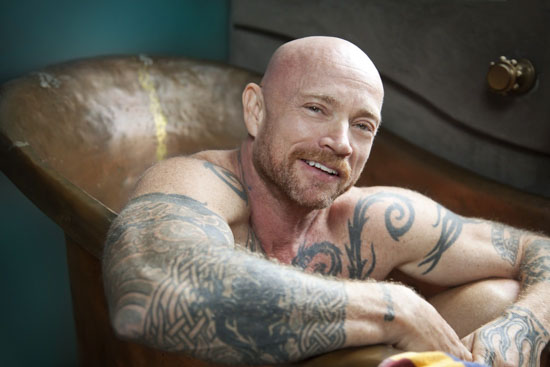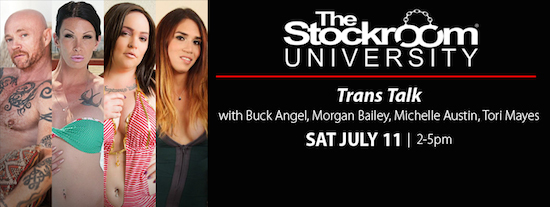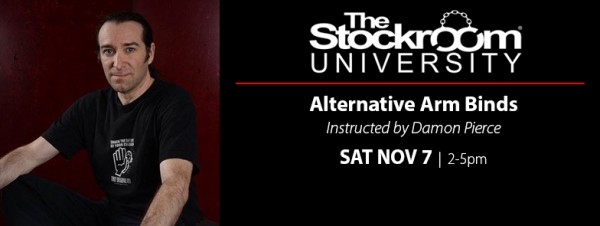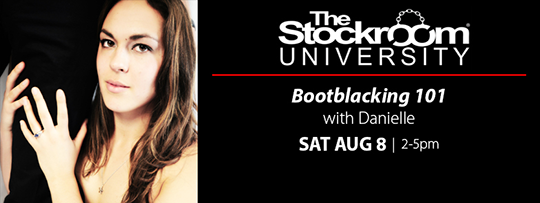
Here at Stockroom, we’re really looking forward to playing host to adult star and educator Buck Angel, the self-proclaimed “man with a pussy” in a couple of weeks. On July 11 Buck, along with adult stars Michelle Austin, Morgan Bailey and Tori Mayes, is going to take part in “Trans Talk,” a panel that will talk about the trans identities, experiences, and issues inside and outside of the adult industry.
The Trans Talk panel is especially relevant and important now: As trans visibility is increased by things such as Caitlyn Jenner’s glamorous debut in the pages of Vanity Fair or Laverne Cox gaining celebrity from her role on Orange is the New Black, more people than ever are talking about transgender individuals and identities in public. Unfortunately, just because the amount of talk in the mainstream is increasing doesn’t mean that understanding of trans experiences is keeping pace. It’s an honor for us that Buck Angel and his colleagues are coming to Stockroom to take the talk farther.
Not everyone is so honored to play host to Buck Angel, however. Last week, Facebook shut down his account until he could “verify” his identity in keeping with their “real names” policy.
Buck is not the first person to face this conflict with Facebook. Not even remotely. Controversy over Facebook’s “Real Names” has been building in the last year among queer, trans, and sex work communities. In San Francisco, a coalition of activists recently demanded that the Board of Directors of SF Pride ban Facebook from sponsoring or marching in last weekend’s parade. SF Pride refused, but it remains a contentious issue in the community, and the board itself was split on the decision.
One of the first things that you learn after spending any amount of time as a member of kinky or LBTQIA communities is that what’s on someone’s birth certificate or driver’s license isn’t really a good indicator of who they are. After spending years among kinksters, you’ll inevitably find that you don’t know the legal names of many of the people you love and trust most in the world. You also come to realize that it’s not important. You know who they are, and how much you can trust them, and the identity that they’ve chosen for themselves means more than what you’d get from the legal name.
The reasons those names are chosen vary as much as the people themselves: For trans people, the name is a statement of identity, chosen to reflect the person that they’ve always felt themselves to be; many refer to the old one as their “dead name,” representing a part of their life that’s behind them. For kink players, it may be a persona that they use in dungeon scenes. For youth whose families don’t support their sexual or gender identities, an online pseudonym is simply a way that they can participate in online communities without being outed.
What all those reasons have in common is that it is not only disrespectful to deny someone the chance to use their chosen name, in many cases it’s dangerous. While Facebook claims that its “Real Names” policy is meant to make the site safer, it in fact exposes many people to harassment and abuse, both online and off.
When Buck Angel was born, someone checked a box on his birth certificate that said “female”; he grew up and realized that what it said on that piece of paper was wrong. Other trans people have done the same thing in one direction or the other. Some have decided that neither box suited who they were, and identify as nonbinary.
The difference between us and Facebook is that we realize that Buck Angel is his real name because it’s the one he’s chosen for himself. Acknowledging that is not only a courtesy, but for some, a matter of life and death. Despite the celebrity of Laverne Cox and Caitlyn Jenner, being trans or queer is dangerous in and of itself. Saying “I am trans” amounts to more than just unchecking and checking a box. Depending on where someone lives and in what circumstances, saying those three words could make them lose everything, up to and including their life.
One of the organizers of the San Francisco protest movement, drag queen Lil Miss Hot Mess, wrote in The Guardian about the reasons that people use aliases:
For many vulnerable users, logging on to Facebook isn’t merely a time suck, but is a way of building safe and supportive communities, sharing resources or planting the seeds of political change. For example, after launching a survey to collect users’ testimonials, our group heard from several transgender users who have used the site in different ways: one person used Facebook as a way of “testing names out to see if they fit” before going through the process of a legal name change. Another wrote us about using Facebook to share pictures and resources to demystify her transition and to encourage friends to “start using [the] new name”. A third disclosed that using her chosen name on Facebook allowed her space to avoid the abuse she otherwise endured in her real life.
As of now, Buck has his account back and is on Facebook again. But his identity has been hard-won, and he shouldn’t have to prove it to anyone.

We hope that you’ll join us for the Trans Talk panel on July 11 so that you can listen to Buck Angel, Michelle Austin, Morgan Bailey and Tori Mayes speak for themselves.












